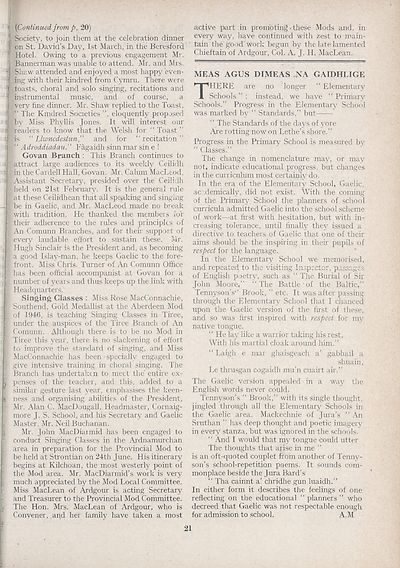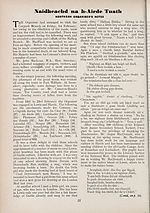An Comunn Gàidhealach Publications > Gaidheal > Volumes 46--48, January 1951--December 1953
(255) Page 21
Download files
Complete book:
Individual page:
Thumbnail gallery: Grid view | List view

\ \ {Continued fromp, 20)
■ociety, to join them at the celebration dinner
■ on St. David’s Day, 1st March, in the Beresforcl
| Hotel. Owing to a previous engagement Mr.
■Bannerman was unable to attend. Mr. and Mrs.
fShaw attended and enjoyed a most happy even¬
ting with their kindred from Cymru. There were
Ktoasts, choral and solo singing, recitations and
^instrumental music, and of course, a
jlvery fine dinner. Mr. Shaw replied to the Toast,
m‘ The Kindred Societies ”, eloquently proposed
!| by Miss Phyllis Jones. It will interest our
ireaders to know that the Welsh for ‘‘ Toast ”
i |:is “ Llwncdestun,” and for “recitation”
8 j|“ Adroddiadau.” Fagaidh sinn mar sin e !
-j r Govan Branch : This Branch continues to
ii Rattract large audiences to its weekly Ceilidh
“ Sin the Cardell Hall, Govan. Mr. Calum MacLeod,
^Assistant Secretary, presided over the' Ceilidh
Rheld on 21st February. It is the general rule
f at these Ceilidhean that all speaking and singing
■ be in Gaelic, and Mr. MacLeod made no break
I with tradition. He thanked the members for
itheir adherence to the rules and principles of
I An Comunn Branches, and for their support of
( every laudable effort to sustain these. Mr.
1 Hugh Sinclair is the President and, as becoming
l a good Islay-man, he keeps Gaelic to the fore-
I front. Miss Chris. Turner of An Comunn Office
has been official accompanist at Govan for a
number of years and thus keeps up the link with
Headquarters.
Singing Classes : Miss Rose MacConnachie,
Southend, Gold Medallist at the Aberdeen Mod
of 1946, is teaching Singing Classes in Tiree,
under the auspices of the Tiree Branch of An
Comunn. Although there is to be no Mod in
Tiree this year, there is no slackening of effort
to improve the standard of singing, and Miss
MacConnachie has been - specially engaged to
give intensive training in choral singing. The
Branch has undertaken to meet the' entire ex¬
penses of the teacher, and this, added to a
similar gesture last year, emphasises the keen¬
ness and organising abilities of the President,
Mr. Alan C. MacDougall, Headmaster, Cornaig-
more J. S. School, and his Secretary and Gaelic
Master, Mr. Neil Buchanan.
Mr. John MacDiarmid has been engaged to
conduct Singing Classes in the Ardnamurchan
area in preparation for the Provincial Mod to
be held at Strontian on 24th June. His itinerary
begins at Kilchoan, the most westerly point of
the Mod area. Mr. MacDiarmid’s work is very
much appreciated by the Mod Local Committee.
Miss MacLean of Ardgour is acting Secretary
and Treasurer to the Provincial Mod Committee.
The Hon. Mrs. MacLean of Ardgour, who is
Convener, and her family have taken a most
active part in promoting These Mods and, in
every way, have continued with zest to main¬
tain the good'work begun by the late lamented
Chieftain of Ardgour, Col. A. J. H. MacLean.
MEAS AGUS DIMEAS ,NA GAIDHLIGE
THERE are no longer “ Elementary
Schools”; instead, we have “Primary
Schools.” Progress in the Elementary School
was marked by “ Standards,” but
“ The Standards of the days of yore
A,re rotting now on Lethe’s shore.”
Progress in the Primary School is measured by
“ Classes.”
The change in nomenclature may, or may
not, indicate educational progress, but changes
in the curriculum most certainly do.
In the era of the Elementary School, Gaelic,
ac:.demically, did not exist. With the coming
of the Primary School the planners of school
curricula admitted Gaelic into the school scheme
of work—at first with hesitation, but with in¬
creasing tolerance, until finally they issued a
directive to teachers of Gaelic that one of their
aims should be the inspiring in their pupils of
respect for the language.
In the Elementary School we memorised,
and repeated, to the visiting Inspector, passages
of English poetry, such as ‘ ‘ The Burial of Sir
John Moore,” “The Battle1 of the Baltic,”
Tennyson’s*' Brook, ” etc. It was after passing
through the Elementary School that I chanced
upon the Gaelic version of the first of these,
and so was first inspired with respect for my
native tongue.
“ He lay like a warrior taking his rest,
With his martial cloak around him.”
“ Laigh e mar ghaisgeach a’ gabhail a
shuain,
Le thrusgan cogaidh mu’n cuairt air.”
The Gaelic version appealed in a way the
English words never could.
Tennyson’s “ Brook,” with its single thought,
jingled through all the Elementary Schools in
the Gaelic area. Mackechnie of Jura’s “ An
Sruthan ” has deep thought and poetic imagery
in every stanza, but was ignored in the schools.
“ And I would that my tongue could utter
The thoughts that arise in me ”
is an oft-quoted couplet from another of Tenny¬
son’s school-repetition poems. It sounds com¬
monplace beside the Jura Bard’s
“ Tha cainnt a’ chridhe gun luaidh.”
In either form it describes the feelings of one
reflecting on the educational “ planners ” who
decreed that Gaelic was not respectable enough
for admission to school. A.M
21
■ociety, to join them at the celebration dinner
■ on St. David’s Day, 1st March, in the Beresforcl
| Hotel. Owing to a previous engagement Mr.
■Bannerman was unable to attend. Mr. and Mrs.
fShaw attended and enjoyed a most happy even¬
ting with their kindred from Cymru. There were
Ktoasts, choral and solo singing, recitations and
^instrumental music, and of course, a
jlvery fine dinner. Mr. Shaw replied to the Toast,
m‘ The Kindred Societies ”, eloquently proposed
!| by Miss Phyllis Jones. It will interest our
ireaders to know that the Welsh for ‘‘ Toast ”
i |:is “ Llwncdestun,” and for “recitation”
8 j|“ Adroddiadau.” Fagaidh sinn mar sin e !
-j r Govan Branch : This Branch continues to
ii Rattract large audiences to its weekly Ceilidh
“ Sin the Cardell Hall, Govan. Mr. Calum MacLeod,
^Assistant Secretary, presided over the' Ceilidh
Rheld on 21st February. It is the general rule
f at these Ceilidhean that all speaking and singing
■ be in Gaelic, and Mr. MacLeod made no break
I with tradition. He thanked the members for
itheir adherence to the rules and principles of
I An Comunn Branches, and for their support of
( every laudable effort to sustain these. Mr.
1 Hugh Sinclair is the President and, as becoming
l a good Islay-man, he keeps Gaelic to the fore-
I front. Miss Chris. Turner of An Comunn Office
has been official accompanist at Govan for a
number of years and thus keeps up the link with
Headquarters.
Singing Classes : Miss Rose MacConnachie,
Southend, Gold Medallist at the Aberdeen Mod
of 1946, is teaching Singing Classes in Tiree,
under the auspices of the Tiree Branch of An
Comunn. Although there is to be no Mod in
Tiree this year, there is no slackening of effort
to improve the standard of singing, and Miss
MacConnachie has been - specially engaged to
give intensive training in choral singing. The
Branch has undertaken to meet the' entire ex¬
penses of the teacher, and this, added to a
similar gesture last year, emphasises the keen¬
ness and organising abilities of the President,
Mr. Alan C. MacDougall, Headmaster, Cornaig-
more J. S. School, and his Secretary and Gaelic
Master, Mr. Neil Buchanan.
Mr. John MacDiarmid has been engaged to
conduct Singing Classes in the Ardnamurchan
area in preparation for the Provincial Mod to
be held at Strontian on 24th June. His itinerary
begins at Kilchoan, the most westerly point of
the Mod area. Mr. MacDiarmid’s work is very
much appreciated by the Mod Local Committee.
Miss MacLean of Ardgour is acting Secretary
and Treasurer to the Provincial Mod Committee.
The Hon. Mrs. MacLean of Ardgour, who is
Convener, and her family have taken a most
active part in promoting These Mods and, in
every way, have continued with zest to main¬
tain the good'work begun by the late lamented
Chieftain of Ardgour, Col. A. J. H. MacLean.
MEAS AGUS DIMEAS ,NA GAIDHLIGE
THERE are no longer “ Elementary
Schools”; instead, we have “Primary
Schools.” Progress in the Elementary School
was marked by “ Standards,” but
“ The Standards of the days of yore
A,re rotting now on Lethe’s shore.”
Progress in the Primary School is measured by
“ Classes.”
The change in nomenclature may, or may
not, indicate educational progress, but changes
in the curriculum most certainly do.
In the era of the Elementary School, Gaelic,
ac:.demically, did not exist. With the coming
of the Primary School the planners of school
curricula admitted Gaelic into the school scheme
of work—at first with hesitation, but with in¬
creasing tolerance, until finally they issued a
directive to teachers of Gaelic that one of their
aims should be the inspiring in their pupils of
respect for the language.
In the Elementary School we memorised,
and repeated, to the visiting Inspector, passages
of English poetry, such as ‘ ‘ The Burial of Sir
John Moore,” “The Battle1 of the Baltic,”
Tennyson’s*' Brook, ” etc. It was after passing
through the Elementary School that I chanced
upon the Gaelic version of the first of these,
and so was first inspired with respect for my
native tongue.
“ He lay like a warrior taking his rest,
With his martial cloak around him.”
“ Laigh e mar ghaisgeach a’ gabhail a
shuain,
Le thrusgan cogaidh mu’n cuairt air.”
The Gaelic version appealed in a way the
English words never could.
Tennyson’s “ Brook,” with its single thought,
jingled through all the Elementary Schools in
the Gaelic area. Mackechnie of Jura’s “ An
Sruthan ” has deep thought and poetic imagery
in every stanza, but was ignored in the schools.
“ And I would that my tongue could utter
The thoughts that arise in me ”
is an oft-quoted couplet from another of Tenny¬
son’s school-repetition poems. It sounds com¬
monplace beside the Jura Bard’s
“ Tha cainnt a’ chridhe gun luaidh.”
In either form it describes the feelings of one
reflecting on the educational “ planners ” who
decreed that Gaelic was not respectable enough
for admission to school. A.M
21
Set display mode to:
![]() Universal Viewer |
Universal Viewer | ![]() Mirador |
Large image | Transcription
Mirador |
Large image | Transcription
| An Comunn Gàidhealach > An Comunn Gàidhealach Publications > Gaidheal > Volumes 46--48, January 1951--December 1953 > (255) Page 21 |
|---|
| Permanent URL | https://digital.nls.uk/127506733 |
|---|
| Description | This contains items published by An Comunn, which are not specifically Mòd-related. It includes journals, annual reports and corporate documents, policy statements, educational resources and published plays and literature. It is arranged alphabetically by title. |
|---|
| Description | A collection of over 400 items published by An Comunn Gàidhealach, the organisation which promotes Gaelic language and culture and organises the Royal National Mòd. Dating from 1891 up to the present day, the collection includes journals and newspapers, annual reports, educational materials, national Mòd programmes, published Mòd literature and music. |
|---|---|
| Additional NLS resources: |
|

